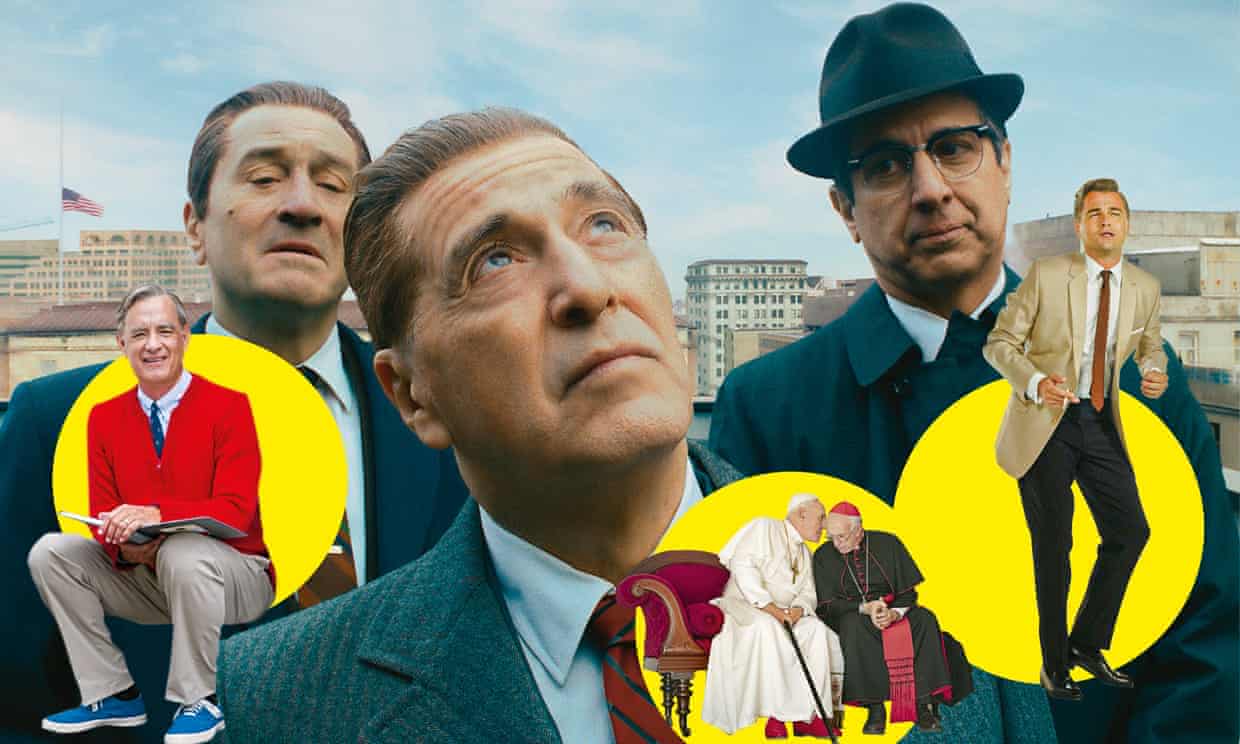
Steve Rose on film
No country for young men: why are the male actor nominees so old?
Pacino, Hanks, Hopkins: this year’s Oscar and Bafta male acting categories feature the same old faces. Is it time for a youth rebellion?
by Steve RoseIt is hardly breaking news that Hollywood skews towards white males, but looking down this awards season’s acting nominations, a certain kind of white male dominates: basically you have got a choice between old and older.
The Oscars’ best supporting actor shortlist is particularly jarring: Tom Hanks, Anthony Hopkins, Al Pacino, Joe Pesci, Brad Pitt. Is this 1991 or something? The average age is 71, and none of them are below 56. It doesn’t get much fresher-faced with best actor: Antonio Banderas, Leonardo DiCaprio, Adam Driver, Joaquin Phoenix, Jonathan Pryce. Average age: 51. Driver is the only one under 40. For comparison, the average for best supporting actress is 38 and best actress 37. The men’s lists are identical for the Baftas apart from Taron Egerton instead of Banderas, which at least lowers the figures a little.
Look at the female acting and supporting acting nominees at both the Oscars and Baftas, and there is a generation of promising young talent: Saoirse Ronan, Florence Pugh, Jessie Buckley, Margot Robbie, Cynthia Erivo, Margot Robbie again. Why isn’t this youthfulness reflected in the men’s categories? It’s not as though there aren’t any decent contenders. Could it be they are having to fight harder to break through? Because all the seats at the top table are occupied by the same old dudes who have occupied them for the past 20 years, and they are not planning on budging?
Even beyond the awards bubble, there is the impression that Hollywood is no country for young men. Tom Cruise (57) is still leaping in and out of planes. In the next Bond movie, Daniel Craig will be pretty much the same age Sean Connery was when he came out of retirement for Never Say Never Again. Keanu Reeves, Robert Downey Jr, Dwayne Johnson, Hugh Jackman, Mark Wahlberg: all pushing or over 50. You could argue that actors get better the longer they do it, but that doesn’t account for the gender disparity.
Perhaps the real problem is that female actors cannot expect the same career longevity in an industry that, being male-dominated, might have a vested interest in promoting messages about the ongoing virility and viability of older men. Coincidentally, anxieties over male obsolescence and mortality run through a few of this year’s contenders: Scorsese’s Nearly Deadfellas (AKA The Irishman); Tarantino’s Once Upon a Midlife Crisis … in Hollywood; Joker’s elegy for the left-behind white guy; the patriarchy-smashing Bombshell; The Great Netflix Pope-Off; Almodóvar’s (back) Pain and (fading) Glory. The only movie with space for young men this year is 1917, in which they’re killed off in droves on the orders of their elders. Maybe Hollywood senses a youth rebellion coming; looking at this lot, it is probably overdue.